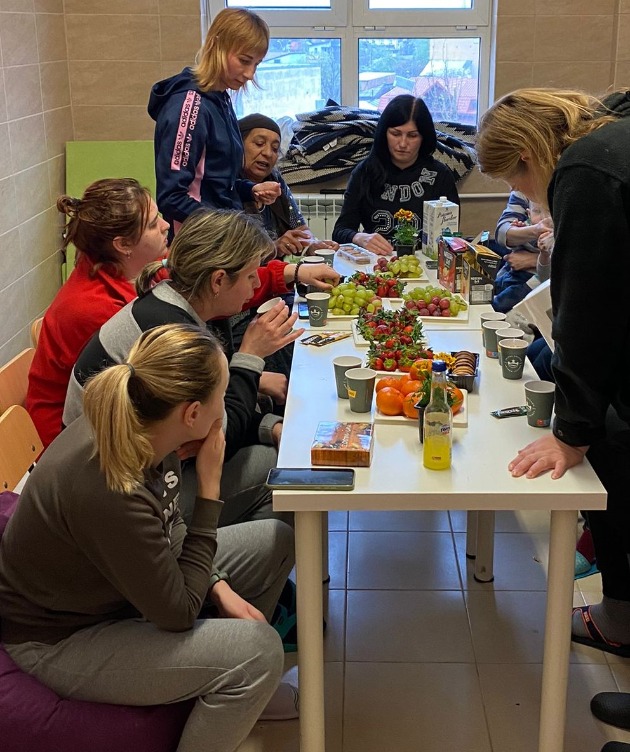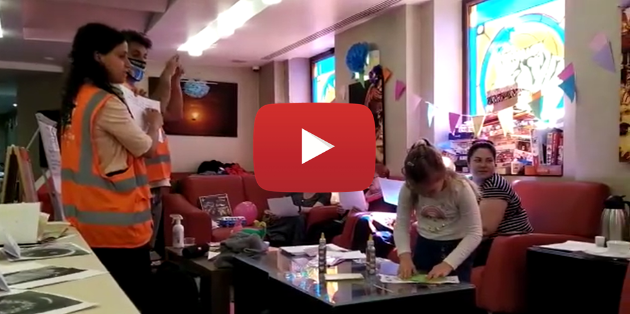Last week, Jewish families around the world sat
down and partook in the millennia-old tradition of the Passover meal. However,
for Ukrainian refugees in Israel, the storied celebration of freedom brought
with it mixed emotions as many joined seders with families supported by Jewish
National Fund-USA’s MAKOM Communities in the Negev and Galilee.
Thousands of Ukrainian refugees and immigrants
have been temporarily settled all over Israel. Some communities, like in
Givatayim, house just a dozen people – while others, like in Netanya,
accommodate nearly 1000. And in every hotel that has immigrants, MAKOM
volunteers helped to prepare beautiful seders.
MAKOM volunteers teach Ukrainian children how to sing Ma Nishtanah
Beth Banks Cohn, donor and Chair of the Jewish National Fund-USA MAKOM Task Force, lauded the efforts of the volunteers on the ground in Israel. “The work the volunteers do with the refugees is an extension of what they’ve already been doing. They want to make their communities better, one person at a time.”
Additionally, Cohn explained that MAKOM works with individuals to absorb them into Israeli society, benefiting both the individual and the community.
“One of the reasons MAKOM communities do this – aside from wanting everyone in the community to have the best life possible – is that some community members are first-generation Israelis, themselves. So, for certain community members, it’s an opportunity to provide a better experience for new olim [immigrants] than they themselves had – and invite them into the country in a better way than Israel sometimes works.”
And already, the plan is achieving results. One MAKOM volunteer reported on a recent conversation that she had with one of the refugees, saying, “It’s difficult to describe what happened there briefly… [but] it started with the fact that we brought fruit and vegetables for the [Passover] event and asked the women to help with the preparations of cutting vegetables and fruits. They were so happy and started crying with excitement. It reminded them of home. They said how much they miss cooking for themselves and their family – and went on to say that this was the first time since the beginning of the war that someone asked them how they were and how they were feeling. And then it ended with their understanding that they have a lot of strength to act and move forwards… and that someone truly sees them.”
Likewise, Ukrainian immigrant ‘Larisa’ said, “We’re being noticed. They [Jewish National Fund-USA] care. Our feelings are out there, and these people help us feel better. No one will take away what we went through, but this human contact and connection makes us feel somewhat ’normal.’”

Moreover, many volunteers are working beyond just holiday preparations toward proper integration. Already, for 8-hours every day, the volunteers go to the hotels where Ukrainians are being housed and teach Hebrew. They also play with the children, help fill out forms, give relief to new mothers, and provide a more structured day for everyone. And then, every Friday night, they organize a Kabbalat Shabbat service.
Meantime, between MAKOM, Jewish National Fund-USA, and the organization’s Community Building program, the benefits extend to the whole country – mainly as MAKOM Communities are already spread out across the nation.
Currently, some 90% of Israel’s population is concentrated in the center of the country – in what’s referred to as the Tel Aviv-Haifa-Jerusalem Corridor. But that leaves roughly 80% of the country’s total geography underpopulated. For one, the Negev desert region represents some 60% of the country’s landmass but houses only 8% of the population.
Jewish National Fund-USA’s community-building program hopes to change this by drawing citizens (including new Ukrainian immigrants) into the Northern and Southern regions through economic and developmental incentives. The organization’s Go North and Blueprint Negev strategies are being created to realize the full potential of the country’s outer areas by turning them into the agricultural, technological, and tourism centers they deserve to be.
And both programs leverage partnerships local and national organizations to expedite the process – by offering faster housing development, career and employment training, and plans for new healthcare centers, family recreation sites, and green spaces to visit.The Go North initiative, for example, has the goal of bringing 300,000 new residents to the area. And it draws new inhabitants towards the Galilee’s incredible panoramic scenery by supporting critical infrastructure and opportunities for education and employment – especially in technology, tourism, the food industry, hospitality, and agricultural research and development. Likewise, Jewish National Fund-USA’s philanthropic investments are establishing two new medical centers in the Western and Upper Eastern Galilee regions, in the Erez College Natural Gas Vocational Training Center in Shlomi – where 12,000 students have already graduated – and the world-class Culinary Academy in Kiryat Shmona, among others.
Then, towards the country’s southern regions, JNF USA runs the Blueprint Negev program, which hopes to draw half a million new residents into the Negev and Arava deserts. And the organization is already funding the development of community parks, playgrounds, youth centers, and much more. This, while necessarily tackling the tough challenges that the region poses, like scarce water supplies, lack of sewage and irrigation systems, and lack of job opportunities.
As Ukrainian refugees celebrate their first Passover in Israel, many of them will feel immense joy in being connected with their Jewish brethren, yet also trepidation as to what their future holds. However, through Jewish National Fund-USA’s efforts, their path forward has been made a little clearer and a lot more hopeful thanks to the organization’s philanthropic investments in housing, job creation, schools and so much more. In one loud united voice, the premier philanthropy for Israel has said: “you can count on us to ensure a bright future for you, your children’s children, and for future generations to come.”

